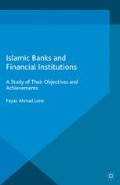Abstract
In the previous chapter, Islamic finance and its background were discussed in order to understand the nature of Islamic finance from a Shari’ah point of view. In order to obtain a thorough understanding of the system of Islamic finance, there was also a discussion of the different types of riba. The present chapter moves on to an explanation of the objectives of Islamic finance. These objectives have been classified into four separate categories: Islamic objectives, social objectives, ethical objectives and economic objectives.
Access this chapter
Tax calculation will be finalised at checkout
Purchases are for personal use only
Preview
Unable to display preview. Download preview PDF.
References
Ahmad, K. (2000) “Islamic Finance and Banking: the Challenge and Prospects.” Review of Islamic Economics, vol. 9, pp. 57–82.
Chapra, M. U. (1979) Objectives of the Islamic Economic Order. Leicester: The Islamic Foundation.
Chapra, M. U. (1985) Towards a Just Monetary System. Leicester; UK: The Islamic Foundation.
Dusuki, A. W. (2008) “Understanding the Objectives of Islamic Banking: a Survey of Stakeholders’ Perspectives.” International Journal of Islamic and Middle Eastern Finance and Management, vol. 1, no. 2, pp. 132–48.
Jaziri (1938) Kitab al-Fiqh ala al-Mudhahib al-arabaah. Caro vol. 2, pp. 153–68.
Kahf, M. (1999) “Islamic Banks at the Threshold of the Third Millennium.” Thunderbird International Business. Review, vol. 4, nos 4/5, pp. 445–60.
Khattak, N. A., Khashif-Ur-Rehman, Sofwan, N. and Ullah, W. (2011) “Islamic Banking System: Stakeholder’s Attitude Towards the Islamic Banking System Objective Setting.” African Journal of Business Management, vol. 5, no. 3, pp. 676–80.
Masud, K. (1995) Shatibi’s Philosophy of Islamic Law. Islamabad: International Islamic University of Islamabad, Islamic Research Institute.
Mirakhor, A. (2000) “General characteristics of an Islamic economic system.” In A. Siddiqi (ed.), Anthology of Islamic Banking. London: Institute of Islamic Banking and Insurance, pp. 11–31.
Siddiqui, M. N. (2004) Keynote Address at Islamic Development Bank Roundtable on Islamic Economics: Current State of Knowledge and Development of the Discipline, Jeddah, 26–7 May.
Walbridge, J. (2002) “Islamic Concept of Asking Questions: Ilm-ul-Ikhtilaf, the Institutionalization of Disagreement.” Islamic Studies, vol. 41, no. 1, pp. 69–86.
Waliullah, S. (1750, trans. 1995) Hujjat Allah Al-Baligha Hujjat, translated as The Conclusive Argument from God by Marcia K. Hermansen. Leiden: E. J. Brill Academic Publishers.
Warde, I. (2000) Islamic Finance in the Global Economy. Edinburgh: Edinburgh University Press.
Yousri A. A. (2004) “Islamic Economics: Its Development as a Scientific Discipline.” Paper presented at Islamic Development Bank Roundtable on Islamic Economics: Current State of Knowledge and Development of the Discipline, Jeddah, 26–7 May.
Zakariyya Kandehlvi, Shaikh-ul-Hadeeth Maulana Mohammad (1938) Al-Aitdal fil Maratib Al-Rajjal. Lahore: Maktaba Zakariyya.
Zaman, I. (1985) “Towards Islamic Ways of Islamization: Problems in the Modernization of the Ahkaam of Shari’ah and Da’wah.” Pakistan Administration, vol. XXII, no. 2, pp. 1–19.
Author information
Authors and Affiliations
Copyright information
© 2016 Fayaz Ahmad Lone
About this chapter
Cite this chapter
Lone, F.A. (2016). Objectives of Islamic Finance. In: Islamic Banks and Financial Institutions. Palgrave Macmillan Studies in Banking and Financial Institutions. Palgrave Macmillan, London. https://doi.org/10.1057/9781137515667_4
Download citation
DOI: https://doi.org/10.1057/9781137515667_4
Publisher Name: Palgrave Macmillan, London
Print ISBN: 978-1-349-56414-9
Online ISBN: 978-1-137-51566-7
eBook Packages: Economics and FinanceEconomics and Finance (R0)

